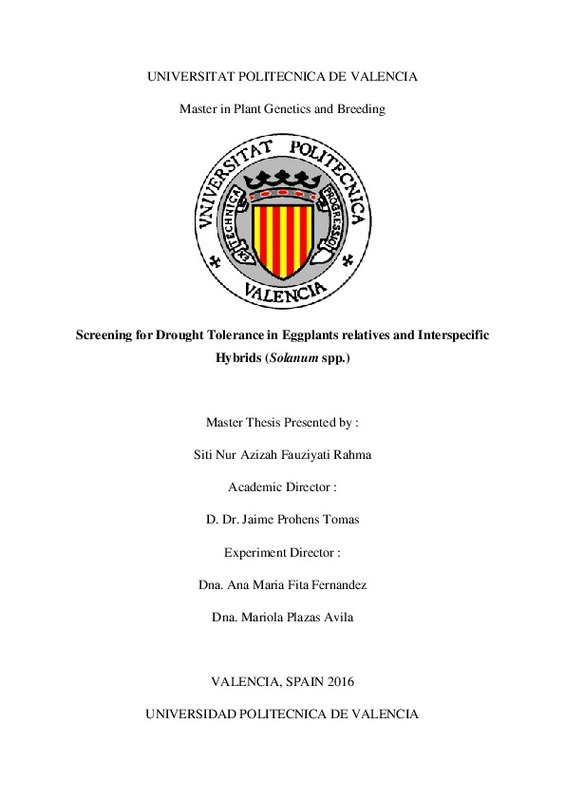|
Resumen:
|
[EN] The scenario posed by climate change forces to develop better ada
pted to drought. Eggplant
is one of the 35 crops judged to be most important for food security and as such is include
d in
the Annex 1 of the ...[+]
[EN] The scenario posed by climate change forces to develop better ada
pted to drought. Eggplant
is one of the 35 crops judged to be most important for food security and as such is include
d in
the Annex 1 of the International Treaty on Plant Genetic Resources
for Food and Agriculture.
Even though the eggplant is not very sensitive crop to drought its toler
ance can still be
improved using their wild relatives (
Solanum
spp.). The aim of this study was to evaluate the
drought tolerance of eggplant and some of their wild relatives, as we
ll as hybrids between
them, to determine the interest of introgress genes for drought toler
ance from these wild
relatives. Experiments were performed in the Solanaceae labora
tory of COMAV, (UPV) for
55 days. Species
S. melongena
,
S. insanum
,
S. dasyphyllum
,
S. linnaeanum
,
S. anguivi
and
their hybrids were used. Two drought treatment (water deficit
and PEG 7%) and one control
were applied. The analysis was focused on plant growth rate (plant
height and leaf area),
biomass, green-color level, photosynthesis rate, transpiration rate,
stomatal conductance,
intercellular CO2 concentration and water-used efficiency. The re
search result concluded that
drought treatment induced an average reduction of 17% in plant height, 30%
in leaf area, and
ii
32% in dry shoot biomass. Moreover, it showed that
S. anguivi
,
S. insanum
, and the hybrids
S. melongena
x
S. anguivi
,
S. melongena
x
S. insanum
, y
S. melongena
x
S. dasyphyllum
were more tolerant to drought condition. Therefore these species and h
ybrids can be used in
future breeding programs for drought resistance in eggplant.
:
[-]
[ES] La berenjena (Solanum melongena) está emparentada con un amplio número de especies silvestres que crecen en condiciones de estrés hídrico. Por tanto, estas especies silvestres representan materiales de interés potencial ...[+]
[ES] La berenjena (Solanum melongena) está emparentada con un amplio número de especies silvestres que crecen en condiciones de estrés hídrico. Por tanto, estas especies silvestres representan materiales de interés potencial para desarrollar berenjenas tolerantes a la sequía. En este trabajo se evaluan accesiones de berenjena cultivada (S. melongena) y de las especies silvestres relacionadas S. anguivi, S. dasyphyllum, S. insanum, y S. linneanum, así como híbridos interspecíficos entre S. melongena y S. anguivi, S. dasyphyllum, y S. insanum. Las plantas se evaluarán en macetas rellenas con sustrato y se aplicarán dos tratamientos de riego: un control y una reducción al 50% de la dosis de riego. Las plantas se cultivarán en una cámara climática con condiciones de temperatura, luz y humedad reguladas y se evaluarán a las 8 semanas después del trasplante. Los caracteres que se medirán serán: área de hoja, altura d eplanta, peso seco de la parte aérea, peso seco de la raíz, eficiencia en el uso de agua, y eficiencia intríseca en el uso de agua. Con los resultados que se obtengan se esperan identificar materiales silvestres interesantes. La información de los híbridos también permitirá contribuir a la herencia de la tolerancia y a evaluar su potencial interés como portainjertos tolerantes a sequía.
[-]
|







